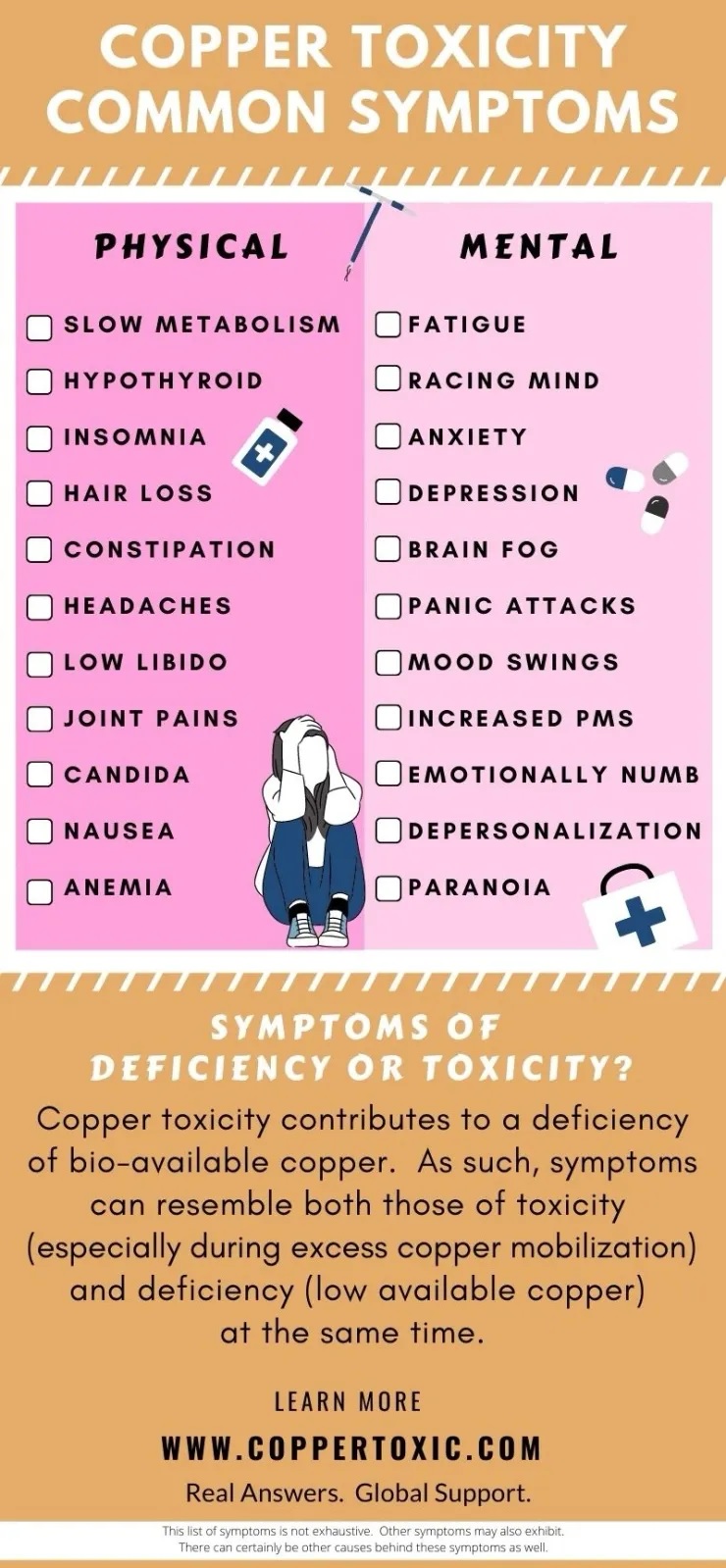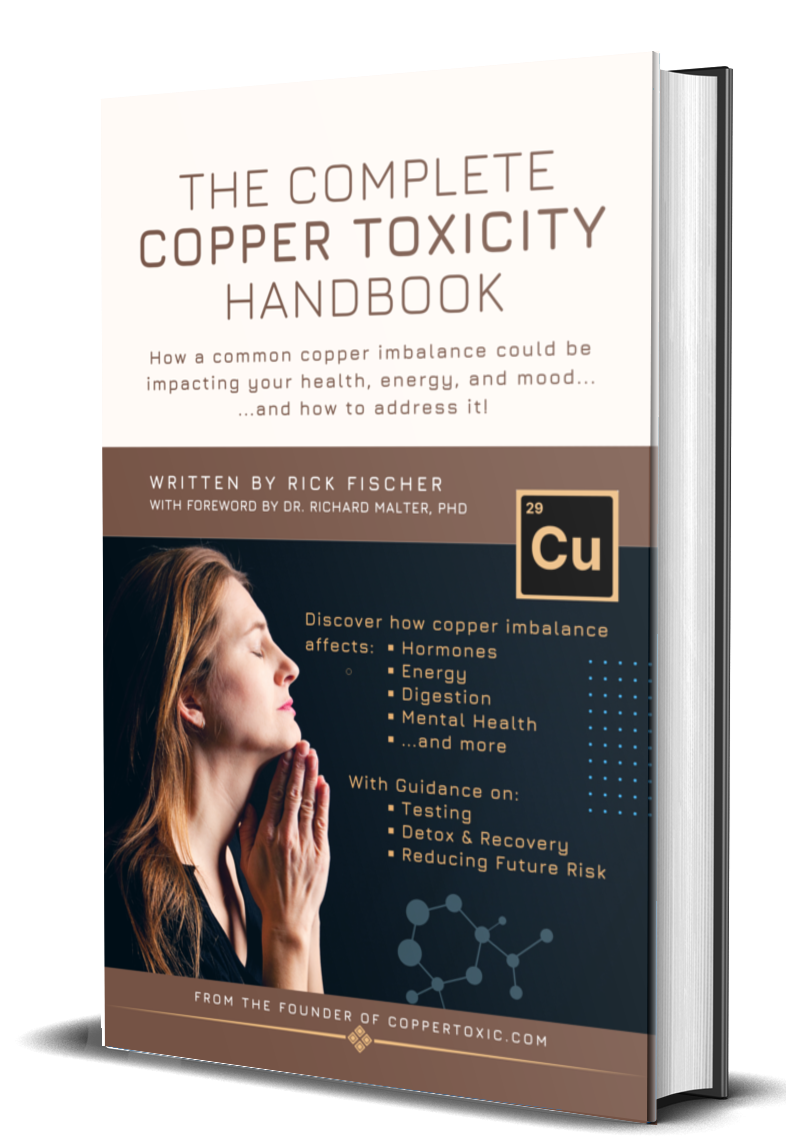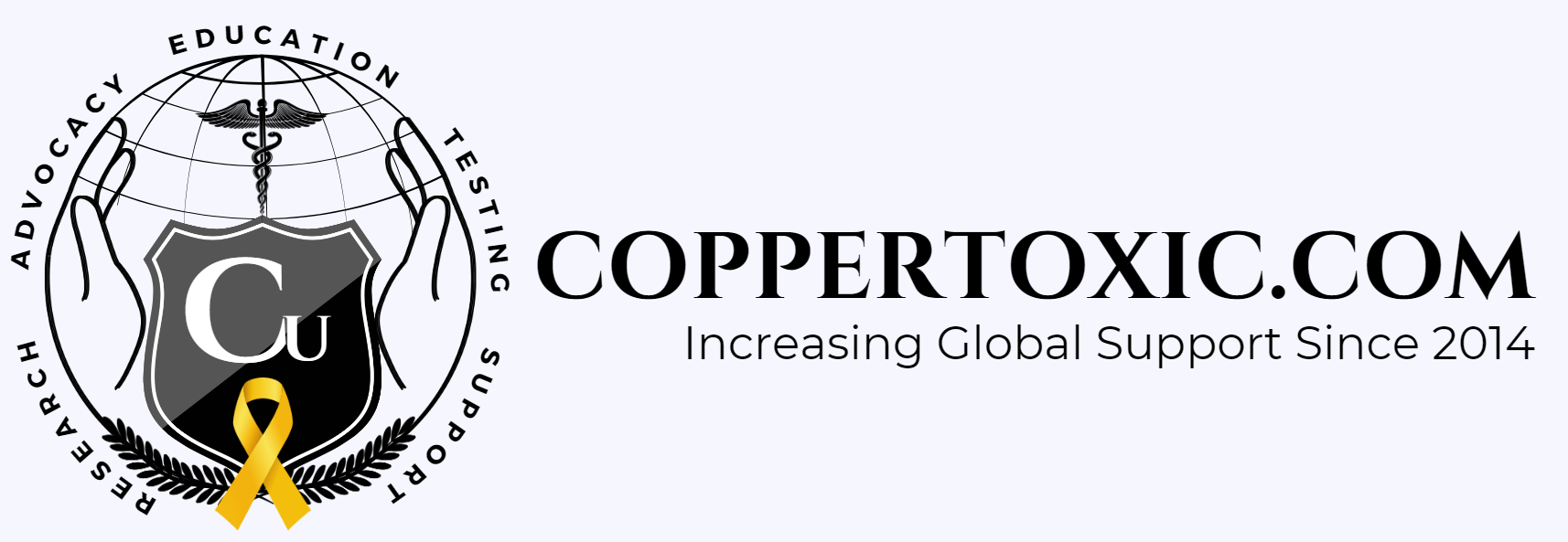Symptoms
Excess copper stored in the body can contribute to a lack of "bio-available" copper. As a result, symptoms of copper toxicity can often reflect both those of excess as well as deficiency. Symptoms may be either physical and/or psychological.
"High cellular copper levels, along with related sulfur deficiencies, can be considered to be one of the most prominent causes of many physical and mental health problems" [1]
"If there is excess copper in the body, then a wide array of psychological and physiological symptoms and conditions can also develop like Tourette’s, schizophrenia, bipolar, mania, autism, asperger’s, anemia, hair loss and much more. Extremely high copper levels can result in a psychotic break." ~Cynthia Perkins, M.Ed [2]
MOST COMMON COPPER TOXICITY SYMPTOMS
-
fatigue and exhaustion, adrenal depletion
-
hypothyroid
-
nausea
-
racing mind (feeling wired but tired)
-
panic attacks
-
depression
-
hair loss and/or whitening of hair
-
brain fog / spaciness
-
concentration and memory problems
-
high anxiety
-
irritability
-
emotional numbing / apathy / despondence
-
ruminating negative thoughts
-
personality change
-
loss of sex drive
-
OCD and Relationship OCD (ROCD)
-
withdrawal / isolation
-
chocolate cravings
-
anemia (similar to iron-deficiency anemia)
-
allergies and mold sensitivity
-
lowered immunity
-
insomnia
-
increased PMS
-
constipation
-
(manic) mood swings
-
despair, hopelessness
Copper toxicity alone, of course, is not the only contributing factor to these symptoms, and simply having a few of these symptoms does not automatically mean a person is copper toxic. However, the more 'boxes that check' from this list, the greater the chance that copper toxicity may be a contributing factor.
Copper Toxicity, or Deficiency?
Many people who are copper toxic, after searching online, discover they have symptoms that resemble copper deficiency. They will come across the slew of online articles that ad nauseam promote the idea of copper deficiency and associated symptoms. Yet, very few of those authors understand that much of the copper deficiency in the West may be attributed, in part, to varying degrees of copper toxicity! That distinction makes a world of difference - the difference between leading people to believe that more copper consumption will do them well, instead of helping people understand that too much copper exposure could be contributing to their symptoms. True dietary copper deficiency in the West is rare.
"At the Princeton Brain Bio Center, where serum heavy metal concentrations are routinely assayed, only three cases of hypocupremia have been documented from over twenty-five thousand patients treated, and these were precipitated by excessive zinc ingestion. In contrast, 64% of all female patients and 37% of all male patients exhibited copper intoxication and subsequent zinc deficiency in 1982. From a clinical standpoint, it is these symptoms and signs with which the physician should be familiar." [3]
(Note: Ample evidence exists to suggest the prevalence of copper toxicity today far exceeds that seen in the 80s).
Thus, while a minority of the population do have a true copper deficiency, most people have a deficiency of bioavailable copper stemming in part from excess exposure / accumulation. Excess copper acts as an excitotoxin, and as the copper level builds up, the adrenals eventually weaken from over stimulation. This in turn leads to an eventual decline in the liver's production of ceruloplasmin (a protein which binds to copper to make it bioavailable); and without adequate ceruloplasmin to bind to the copper, excess copper then gets stored in a bio-unavailable form in soft tissue - creating a deficiency condition. Dr. Malter, Ph.D, one of the leading researchers in this field for over 40 years, uses the analogy of copper toxicity being akin to being stranded in the middle of the ocean and dying of thirst - there is lots of water all around, but none of it is in a form that can be used to drink. As a result, copper toxicity symptoms may simultaneously reflect that of both copper deficiency and toxicity.

Get Your Digital Copy...
"The Complete
Copper Toxicity Handbook"
TOGETHER, WE CAN INCREASE AWARENESS AND MAKE A DIFFERENCE. Receive your eBook copy of this seminal book on Copper Toxicity (including all the info on this website and more) with any donation.

_________________________
References on this Page:
[1] https://acu-cell.com/crcu.html
[2] https://www.holistichelp.net/blog/copper-toxicity-and-how-to-reduce-elevated-levels/
[3] Pfeiffer Carl C., PhD, MD, Mailloux R: Excess Copper as a Factor in Human Disease. Journal of Orthomolecular Medicine Vol. 2. No.3, 1987, pp171-182
© Copyright © 2014-2026 CopperToxic.com - All Rights Reserved.
Reproduction and distribution of material on this website without written permission or clear and proper attribution is strictly prohibited.
